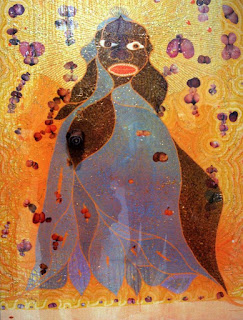 |
| Chris Ofili's "The Holy Virgin Mary" |
President Elect Donald Trump has been rather quiet about his future policies for the arts and what will happen to arts funding during his presidential term - unusual considering how vocal he is about much else. Or at least he has been apart from once, not too long ago. In an interview with the New York Post he told a journalist that he will ban funding for all "degenerate art." Unfortunately, among the deluge of comments he has made to the press - and elsewhere - this has gone sadly under reported. Indeed, one suspects in the cultural wasteland of so much journalism of the early 21st century the significance of this comment has gone unrecognised. However, anyone with an interest in in "modernism" - or indeed postmodernist art - should be more than concerned about this term either in English or in the German where it was once known as "Entartete Kunst". And of course the classification and thus banning of certain art as "degenerate" was not only the preserve of the "Nazies"; similar classifications - and state restrictions - were put in place by both Stalin and Mao - to name only two .
His full quote is as follows and was in response to a question about British Turner Prize-winning painter Chris Ofili's "The Holy Virgin Mary";
“It’s not art. It’s absolutely gross, degenerate stuff. It shouldn’t be funded by government… As President, I would ensure that the National Endowment of the Arts [sic] stops funding of this sort” (It didn't fund this work by the way) (Link to source)
While we ponder this let us do so with banned "degenerate art" from the past.
